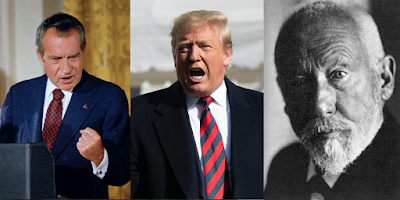Virtuous Counterfactuals: Richard Nixon, Donald Trump, and (oddly enough) Wilhelm Dilthey
In yet another confirmation of the fact that historical “truth” evolves over time, consider how “good” Richard Nixon currently looks compared to Donald Trump.
Many commentators and press outlets -- including The New York Times this past weekend – have reminded us of the precedent set by Richard Nixon following his extremely close loss to John F. Kennedy in the presidential election of 1960.
In his memoir, Six Crises (1962) Nixon recalled why he decided not to press for a recount, despite his claims of voter fraud. Notably enough, his recollections employ abundant counterfactuals
As he recalled:
“If I were to demand a recount, the organization of the new Administration and the orderly transfer of responsibility from the old to the new might be delayed for months. The situation within the entire Federal Government would be chaotic. Those in the old Administration would not know how to act--or with what clear powers and responsibilities--and those being appointed by Kennedy to positions in the new Administration would have the same difficulty making any plans."
“Then too, the bitterness that would be engendered by such a maneuver on my part would, in my opinion, have done incalculable and lasting damage throughout the country. And finally, I could think of no worse example for nations abroad, who for the first time were trying to put free electoral procedures into effect, than that of the United States wrangling over the results of our presidential election, and even suggesting that the presidency itself could be stolen by thievery at the ballot box."
"It is difficult enough to get defeated candidates in some of the newly independent countries to abide by the verdict of the electorate. If we could not continue to set a good example in this respect in the United States, I could see that there would be open-season for shooting at the validity of free elections throughout the world."
“Consequently, I made the decision not to support the contest and recount charges. I know that this greatly disappointed many of my best friends and most ardent supporters--but I could see for myself no other responsible course of action.”
The contrast to Donald “Quixote” Trump’s futile lawsuit frenzy could not be more stark. Nixon actually considered the national interest, unlike Trump who is concerned only with his personal self-interest.
To be sure, Nixon did not entirely ignore considerations of self-interest. As he recalled his later memoir, RN, the Memoirs of Richard Nixon (1978):
“A presidential recount would require up to half a year, during which time the legitimacy of Kennedy's election would be in question….And what if I demanded a recount and it turned out that despite the vote fraud Kennedy had still won? Charges of 'sore loser' would follow me through history and preclude any possibility of a further political career.''
In retrospect, it is clear that Nixon did the right thing. It’s also clear that Donald Trump’s recent truculence has succeeded in making Nixon appear to be a comparatively virtuous, if not quite yet saintly, presidential predecessor.
Trump’s role in helping to upgrade Nixon’s status partly reflects the phenomenon identified by Daniel Patrick Moynihan in the 1980s of “defining deviancy down.” Trump’s corruption has been so extensive that Nixon’s Watergate-era corruption looks mild by comparison; indeed, “Watergate” as benchmark for presidential criminality is sure to disappear as a powerful signifier going forward (thought what it will be replaced by is anybody’s case).
Trump’s role in helping to rehabilitate Nixon also illustrates the fact interpretations of history are always in flux. One of the better illustrations of this reality was provided by the famous German history Wilhelm Dilthey. In his collection of fragmentary writings, The Construction of the Historical World in the Human Studies (portions of which were published as early as 1906), Dilthey argued that the meaning of history was always in flux.
Any “single moment,” he wrote “derives its meaning from its connection with the whole, from the relation between future and past.” The problem, he pointed out, was that the connection “is never complete.” “One would have to wait for the end of a life and, in the hour of death survey the whole to ascertain [its]…relation [with its]…parts. One would have to wait for the end of history to have all the material necessary to determine its meaning.”
Put differently, we can never know how to interpret the meaning of a single chapter in any long historical narrative until the ending is known. No one after Watergate could have imagined Nixon not being as the incarnation of political corruption forever.
But the case of Trump should remind us that meaning is malleable. The good news is that we all have the power to shape historical meaning ourselves. We can mobilize the forces for good so that contrary forces don’t end up determining the ending of our national narrative.



Comments